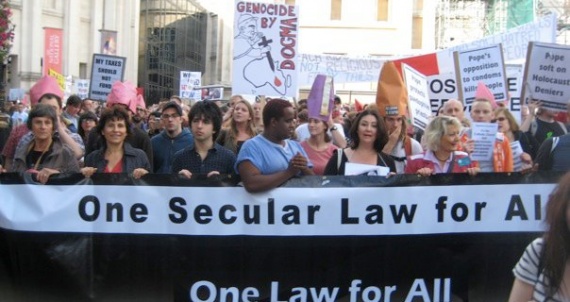The world is getting its first Sikh court in London. That’s a threat to women’s rights, Guardian Comment is Free, 31 May 2024
With the UK judicial system cut to breaking point, conservative religious forces are moving into a space vacated by the state
In 2015, we organised against the establishment of sharia councils and the Muslim arbitration tribunal, which followed the model of Jewish Beth Din courts, because of the threat they posed to our secular legal system. Our concern was that other minority religions would insist their own legal rules and orders be similarly accommodated by the state. It has not taken long for our fear to become a reality.
The Sikh court was set up ostensibly to counter the supposed lack of expertise in secular courts in understanding cultural and religious sensibilities around resolving family and civil disputes. Composed of about 30 magistrates and 15 judges – many of whom are women – the court will use a combination of mediation and arbitration to preside over family and civil disputes in the Sikh community. Judges, of course, are supposed to be impartial, but these judges will adjudicate in accordance with Sikh principles that they have defined.
But there has been no transparent and democratic debate or public consultation on the need for such a court – particularly with Sikh women – or on what constitute Sikh principles.
The use of religious laws to regulate minority women’s lives is not only discriminatory, it is immensely harmful in a context where domestic abuse and related femicides of South Asian and other minority women remain persistently high.
The court presents itself as a professional, quasi-legal body, willing to adhere to formal legal rules of engagement. But so far, spokespeople justifying its existence have indicated a much more worrying agenda.
On 25 April 2024, Baldip Singh, a founder and spokesperson for the Sikh court, pointed to the so-called failure of the secular courts to take account of religious values in a case concerning a divorced Sikh woman who, as the primary carer of her young son, supported his decision to cut his hair in defiance of the wishes of his father (her ex-husband). The stance represents a fight for the preservation of the father’s rights that echoes a wider ideological battle, being fought by abusive men, about how the family courts are biased against them. The all too familiar demand for respect for religious values, regardless of the circumstances, is a worrying patriarchal precedent.
The court says it will address cases involving “low-level domestic violence”, as well as issues of “anger management, gambling and substance misuse” through mediation first and foremost. If mediation is unsuccessful and the parties agree, a case can be brought in front of a judge of the Sikh court, who can give a legally binding judgment under the Arbitration Act 1996. Our concern is how women’s consent will be obtained, and who defines “low-level” domestic violence.
When many minority women seek to escape abuse, they are subjected to pressure and coercion to stay silent, and tolerate the abuse for the sake of keeping their family unit intact. Their profoundly unequal status, coupled with an unequal power distribution over knowledge of legal rights, will make it even more difficult to reject attempts at mediation, or to complain when decisions are made against their interests. The formal UK legal system allows women to obtain legal advice and representation in compliance with the rule of law and principles of fairness. However imperfect, that is a stark contrast to religious courts.
In my own work, I have seen many minority women using these kinds of community mediation systems – not out of choice but fear of stigma, isolation and even violent repercussions. Women have spoken of how the odds are stacked against them in such courts, and how religious leaders blame them for the abuse they have survived or expect them to put up with it, despite the dire risks.
One woman who sought a divorce from her abusive husband was told it was her duty to be “patient” with him, and that she would receive justice in the afterlife. Another was forced to mediate with her controlling and abusive husband, even though she had obtained a protection order from a secular court that blocked his contact with her children due to his violence. “If religious leaders bring their laws, where can we run to?” one woman I worked with asked me.
For that reason, I believe many Sikh women would have objected to the establishment of the Sikh court if consulted. The court itself claims it aims to complement a judicial system that is increasingly overburdened, under-resourced and subject to lengthy delays. That need is clear, as successive governments have hacked away at legal aid, and promoted informal and what are in essence private mediation services in family matters in its place. But conservative religious forces are moving into the space vacated by the state.
Minority women’s rights are in peril in the UK. We are seeing rising numbers of domestic abuse cases, and a serious lack of access to legal advice resulting in an unprecedented rise in the numbers of vulnerable women acting as litigants in person. And now we have the prospect of the unchecked growth of unaccountable religious courts with the potential to make highly arbitrary, potentially discriminatory decisions that serve to undermine women’s rights to protection, equality and non-discrimination that are enshrined in law. We have no choice but to fight back to prevent the Arbitration Act 1996 being used by religious authorities to undermine women’s rights.
-
Pragna Patel is a founding member of Southall Black Sisters and Project Resist, an advocacy and campaigning group for black and minority women

